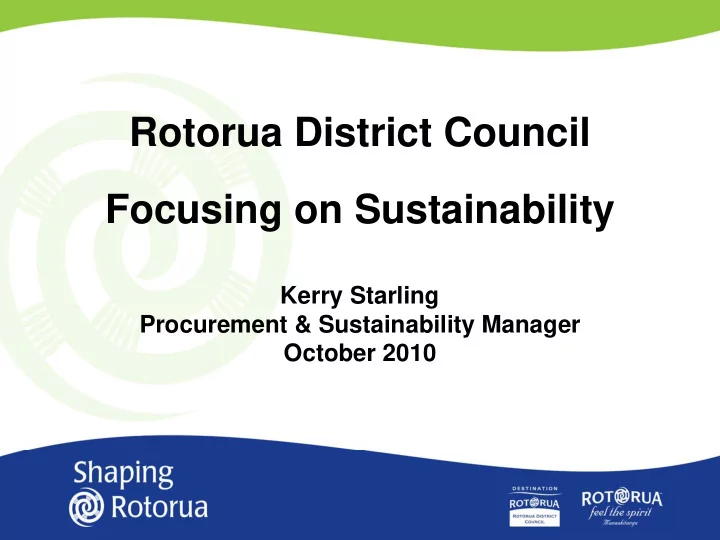

Rotorua District Council Focusing on Sustainability Kerry Starling Procurement & Sustainability Manager October 2010
Commitment • Sustainability Policy adopted by Council in December 2008 - to promote sustainable development as core to all RDC activities • Sustainability ‘Champions’ established - staff with an enthusiasm for sustainability outcomes • Energy Manager – self funding role created to focus on reducing RDC energy use - immediate impact on Council costs • Procurement & Sustainability Manager – title change to reflect the importance of sustainability management within the RDC. • Ten Year Plan – Sustainability identified as one of 3 key themes of the current Ten Year Plan, along with economic growth and affordability.
Energy management • Energy Manager provides focus and dedicated expert resource • energy audits have resulted in considerable cost savings • water conservation and reducing infiltration to sewer system helps • interruptible electricity load initiative at WWTP • more proactive but sustainable use of geothermal resource - geothermal electricity generation being researched • greater use of geothermally heated water at Aquatic Centre • sustainability accreditation – Qualmark Gold at Aquatic Centre • street lighting efficiency assessment undertaken • benefits of emerging technologies in energy efficient street lighting.
Waste management • waste audits and assessments at various sites - recycling well established within RDC operations • community recycling review • expansion of In-Town Recycling Centre - new facility at Ngongotaha • integrated solid waste management at the landfill – reduce, reuse, recycle and compost – focus on waste diversion • methane gas flaring will reduce greenhouse gas emissions and provide revenue through carbon credits • Cleaner Production programme • Keep Rotorua Beautiful.
Improving water quality • strict consent conditions for WWTP, storm water drainage & landfill • effluent liquid is treated then sprayed on the forest, passing through wetlands and mother earth before entering waterways again • any phosphorus still in the treated effluent is held in volcanic soils • trade waste education and enforcement • primary school ‘Water & Us’ education programme • promoting P-free household cleaners • reducing inflow and infiltration during rain events • testing advanced household septic systems • reticulation of lakeside settlements.
Improving air quality • Rotorua has the worst air quality in the North Island - bad for health, particularly in very young and elderly people • 60% of Rotorua’s air pollution comes from home fires • Focus on healthy home initiatives - dry wood, insulation and a change to a cleaner home heating appliance • working with BOP Regional Council on community awareness • draft bylaw will require that non-compliant solid fuel burners must be removed or replaced when a property is sold • government subsidies available to help pay for insulation and clean heating via the Energy Efficiency and Conservation Authority (EECA).
Fleet management • reduced vehicle numbers • safer vehicles, lower emissions and reduced fuel use • improved car pooling system • total cost of ownership approach to procurement • vehicle policy focuses on fuel efficiency • biodiesel consortium being investigated • sustainable transport initiatives within RDC - workplace travel planning - cycling and walking is also encouraged by council • Transport Demand Management strategy.
Waste 2 Gold • 30 tonnes of effluent sludge is produced in Rotorua each day • currently 20% is composted and 80% is landfilled • accounts for 14% of all landfill volume • partnership with Scion to convert effluent sludge into useable carbon products or energy • pilot plant (about 10% scale) designed and being constructed • has potential to save significant cost to ratepayers • has potential for commercialisation.
Recommend
More recommend